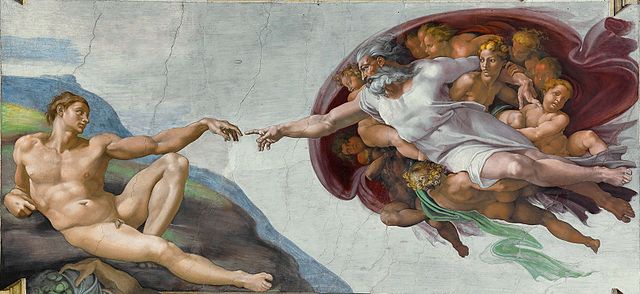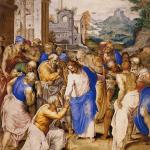
[see the Master List of all twelve installments]
Paolo Pasqualucci (signer of three of the endless reactionary-dominated “corrections” of Pope Francis), a Catholic and retired professor of philosophy of the law at the University of Perugia, Italy, wrote “‘Points of Rupture’ of the Second Vatican Council with the Tradition of the Church – A Synopsis” (4-13-18), hosted by the infamous reactionary site, One Peter Five. It’s an adaptation of the introduction to his book Unam Sanctam – A Study on Doctrinal Deviations in the Catholic Church of the 21st Century.
Pope Benedict XVI, writing as Cardinal Ratzinger, stated that the authority of Vatican II was identical to that of the Council of Trent:
It must be stated that Vatican II is upheld by the same authority as Vatican I and the Council of Trent, namely, the Pope and the College of Bishops in communion with him, and that also with regard to its contents, Vatican II is in the strictest continuity with both previous councils and incorporates their texts word for word in decisive points . . .
Whoever accepts Vatican II, as it has clearly expressed and understood itself, at the same time accepts the whole binding tradition of the Catholic Church, particularly also the two previous councils . . . It is likewise impossible to decide in favor of Trent and Vatican I but against Vatican II. Whoever denies Vatican II denies the authority that upholds the other two councils and thereby detaches them from their foundation. And this applies to the so-called ‘traditionalism,’ also in its extreme forms. Every partisan choice destroys the whole (the very history of the Church) which can exist only as an indivisible unity.
To defend the true tradition of the Church today means to defend the Council. It is our fault if we have at times provided a pretext (to the ‘right’ and ‘left’ alike) to view Vatican II as a ‘break’ and an abandonment of the tradition. There is, instead, a continuity that allows neither a return to the past nor a flight forward, neither anachronistic longings nor unjustified impatience. We must remain faithful to the today of the Church, not the yesterday or tomorrow. And this today of the Church is the documents of Vatican II, without reservations that amputate them and without arbitrariness that distorts them . . .
I see no future for a position that, out of principle, stubbornly renounces Vatican II. In fact in itself it is an illogical position. The point of departure for this tendency is, in fact, the strictest fidelity to the teaching particularly of Pius IX and Pius X and, still more fundamentally, of Vatican I and its definition of papal primacy. But why only popes up to Pius XII and not beyond? Is perhaps obedience to the Holy See divisible according to years or according to the nearness of a teaching to one’s own already-established convictions? (The Ratzinger Report, San Francisco: Ignatius, 1985, 28-29, 31)
For further basic information about the sublime authority of ecumenical councils and Vatican II in particular, see:
Conciliar Infallibility: Summary from Church Documents [6-5-98]
The Bible on Papal & Church Infallibility [5-16-06]
Authority and Infallibility of Councils (vs. Calvin #26) [8-25-09]
The Analogy of an Infallible Bible to an Infallible Church [11-6-05; rev. 7-25-15; published at National Catholic Register: 6-16-17]
“Reply to Calvin” #2: Infallible Church Authority [3-3-17]
“On Adhesion to the Second Vatican Council” (Msgr. Fernando Ocariz Braña, the current Prelate of Opus Dei, L’Osservatore Romano, 12-2-11; reprinted at Catholic Culture) [includes discussion of VCII supposedly being “only” a “pastoral council”]
Pope Benedict on “the hermeneutic of reform, of renewal within continuity” (12-22-05)
The words of Paolo Pasqualucci, from his article, noted above, will be in blue:
*****
4. GS 24.3 affirms that “man is the only creature on earth which God willed for itself,” as if the purpose that guided the creation of man could have been something other than the celebration of the Glory of God and of God as the ultimate end of all things.
Let’s look at this passage from Gaudium et Spes 24.3, in context:
24. God, Who has fatherly concern for everyone, has willed that all men should constitute one family and treat one another in a spirit of brotherhood. For having been created in the image of God, Who “from one man has created the whole human race and made them live all over the face of the earth” (Acts 17:26), all men are called to one and the same goal, namely God Himself.
For this reason, love for God and neighbor is the first and greatest commandment. Sacred Scripture, however, teaches us that the love of God cannot be separated from love of neighbor: “If there is any other commandment, it is summed up in this saying: Thou shalt love thy neighbor as thyself…. Love therefore is the fulfillment of the Law” (Rom. 13:9-10; cf. 1 John 4:20). To men growing daily more dependent on one another, and to a world becoming more unified every day, this truth proves to be of paramount importance.
Indeed, the Lord Jesus, when He prayed to the Father, “that all may be one. . . as we are one” (John 17:21-22) opened up vistas closed to human reason, for He implied a certain likeness between the union of the divine Persons, and the unity of God’s sons in truth and charity. This likeness reveals that man, who is the only creature on earth which God willed for itself, cannot fully find himself except through a sincere gift of himself. (2)
Footnote 2: “cf. Luke 17:33”
Luke 17:33 (RSV) Whoever seeks to gain his life will lose it, but whoever loses his life will preserve it.
Chapter II in this document was specifically about “The Community of Mankind”, so obviously the emphasis will be on relationships between human beings. Even so, in immediate context, reference is made to the thing that Dr. Pasqualucci implies that the document wishes to deny (see in green above): “all men are called to one and the same goal, namely God Himself.” Moreover, it’s clear that the document as a whole is not rejecting this glorifying of God as man’s purpose, at all:
For Sacred Scripture teaches that man was created “to the image of God,” is capable of knowing and loving his Creator, and was appointed by Him as master of all earthly creatures (1) that he might subdue them and use them to God’s glory. (2) (Pt. I, Ch. I, 12.3)
Footnotes:
1. Cf. Gen. 1:26, Wis. 2:23.
2. Cf. Sir. 17:3-10.
Genesis 1:26 Then God said, “Let us make man in our image, after our likeness; and let them have dominion over the fish of the sea, and over the birds of the air, and over the cattle, and over all the earth, and over every creeping thing that creeps upon the earth.”
Wisdom 2:23 for God created man for incorruption, and made him in the image of his own eternity,
Sirach 17:3-10 He endowed them with strength like his own, and made them in his own image. [4] He placed the fear of them in all living beings, and granted them dominion over beasts and birds. [6] He made for them tongue and eyes; he gave them ears and a mind for thinking. [7] He filled them with knowledge and understanding, and showed them good and evil. [8] He set his eye upon their hearts to show them the majesty of his works. [10] And they will praise his holy name, to proclaim the grandeur of his works.
***
The Church holds that the recognition of God is in no way hostile to man’s dignity, since this dignity is rooted and perfected in God. For man was made an intelligent and free member of society by God Who created him, but even more important, he is called as a son to commune with God and share in His happiness. (Pt. I, Ch. 1, 21.3)
***
Then, saved by grace, men will offer flawless glory to God as a family beloved of God and of Christ their Brother. (Pt. I, Ch. II, 32.5)
***
Christians should rather rejoice that, following the example of Christ Who worked as an artisan, they are free to give proper exercise to all their earthly activities and to their humane, domestic, professional, social and technical enterprises by gathering them into one vital synthesis with religious values, under whose supreme direction all things are harmonized unto God’s glory. (Pt. I, Ch. IV, 43.1)
***
Authentic married love is caught up into divine love and is governed and enriched by Christ’s redeeming power and the saving activity of the Church, so that this love may lead the spouses to God with powerful effect and may aid and strengthen them in sublime office of being a father or a mother. (6) For this reason Christian spouses have a special sacrament by which they are fortified and receive a kind of consecration in the duties and dignity of their state. (7) By virtue of this sacrament, as spouses fulfil their conjugal and family obligation, they are penetrated with the spirit of Christ, which suffuses their whole lives with faith, hope and charity. Thus they increasingly advance the perfection of their own personalities, as well as their mutual sanctification, and hence contribute jointly to the glory of God. (Pt. II, Ch. I, 48.3)
Footnotes:
6. Cf. Second Vatican Council, Dogmatic Constitution on the Church: AAS 57 (1965), pp. 15-16; 40-41; 47.
7. Pius XI, encyclical letter Casti Connubii: AAS 22 (1930), p. 583.
***
Furthermore, when man gives himself to the various disciplines of philosophy, history and of mathematical and natural science, and when he cultivates the arts, he can do very much to elevate the human family to a more sublime understanding of truth, goodness, and beauty, and to the formation of considered opinions which have universal value. Thus mankind may be more clearly enlightened by that marvelous Wisdom which was with God from all eternity, composing all things with him, rejoicing in the earth, delighting in the sons of men. (4)
In this way, the human spirit, being less subjected to material things, can be more easily drawn to the worship and contemplation of the Creator. (Pt. II, Ch. II, 57.3-4)
Footnote:
4. Cf. Prov. 8:30-31.
Proverbs 8:30-31 then I was beside him, like a master workman; and I was daily his delight, rejoicing before him always, [31] rejoicing in his inhabited world and delighting in the sons of men.
***
While faithfully adhering to the Gospel and fulfilling her mission to the world, the Church, whose duty it is to foster and elevate (9) all that is found to be true, good and beautiful in the human community, strengthens peace among men for the glory of God. (10) (Pt. II, Ch. IV, 76.6)
Footnotes:
9. Cf. Second Vatican Council, Dogmatic Constitution on the Church, n. 13: AAS 57 (1965), p. 17.
10. Cf. Luke 2:14.
Luke 2:14 “Glory to God in the highest, and on earth peace among men with whom he is pleased!”
***
Not everyone who cries, “Lord, Lord,” will enter into the kingdom of heaven, but those who do the Father’s will by taking a strong grip on the work at hand. Now, the Father wills that in all men we recognize Christ our brother and love Him effectively, in word and in deed. By thus giving witness to the truth, we will share with others the mystery of the heavenly Father’s love. As a consequence, men throughout the world will be aroused to a lively hope—the gift of the Holy Spirit—that some day at last they will be caught up in peace and utter happiness in that fatherland radiant with the glory of the Lord.
Now to Him who is able to accomplish all things in a measure far beyond what we ask or conceive, in keeping with the power that is at work in us—to Him be glory in the Church and in Christ Jesus, down through all the ages of time without end. Amen. (Eph. 3:20-21). (Pt. II, Ch. 5, 93.2-3)
We see, then, that once again, Dr. Pasqualucci has grabbed one text, out of context, and pretended that it somehow contradicts the call to give all glory to God: worshiping and adoring Him as the ultimate end of all things. It’s simply not true.
Daniel J. Castellano, in his Commentary on Gaudium et Spes, states about the “offending” passage:
Saying that man is “the only creature on earth which God willed for itself” is not a denial that God is the final end and goal of all creation, including man, as was just affirmed a paragraph earlier. It simply means that, unlike other creatures, which were willed in part for the good of man, man is not willed for the good of some other creature. He is valued for his own sake, not as an object to be used for the good of another. This is why chattel slavery, for example, is incompatible with the dignity of man. Note the text says “only creature on earth,” for the angels, too, may have this dignity. Yet the Church does not, on this account, allow that man should be a Nietzschean master who determines his own value selfishly. Rather, the intrinsic worth of man is found precisely when he voluntarily makes a gift of himself.
Pope St. John Paul II commented on this passage in his Apostolic Letter Mulieris Dignitatem (15 August 1988)
In the chapter on “The Community of Mankind” in the Pastoral Constitution Gaudium et Spes, we read: “The Lord Jesus, when he prayed to the Father ‘that all may be one … as we are one’ (Jn 17: 21-22), opened up vistas closed to human reason. For he implied a certain likeness between the union of the divine Persons and the union of God’s children in truth and charity. This likeness reveals that man, who is the only creature on earth which God willed for its own sake, cannot fully find himself except through a sincere gift of self”.
With these words, the Council text presents a summary of the whole truth about man and woman – a truth which is already outlined in the first chapters of the Book of Genesis, and which is the structural basis of biblical and Christian anthropology. Man – whether man or woman – is the only being among the creatures of the visible world that God the Creator “has willed for its own sake”; that creature is thus a person. Being a person means striving towards self-realization (the Council text speaks of self-discovery), which can only be achieved “through a sincere gift of self”. The model for this interpretation of the person is God himself as Trinity, as a communion of Persons. To say that man is created in the image and likeness of God means that man is called to exist “for” others, to become a gift. (III, 7)
Conclusion: much ado about nothing . . . nothing here is contrary to Sacred Tradition whatsoever. Dr. Pasqualucci is acting like the corrupt Pharisees of old; missing the forest for the trees:
Matthew 23:23-24 “Woe to you, scribes and Pharisees, hypocrites! for you tithe mint and dill and cummin, and have neglected the weightier matters of the law, justice and mercy and faith; these you ought to have done, without neglecting the others. [24] You blind guides, straining out a gnat and swallowing a camel!”
***
Photo credit: The Creation of Adam (c. 1511), by Michelangelo (1475-1564) [public domain / Wikimedia Commons]
***












